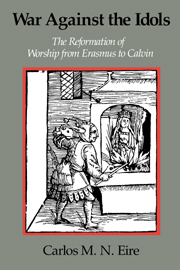Book contents
- Frontmatter
- Contents
- Acknowledgments
- Abbreviations
- INTRODUCTION
- 1 THE STATE OF LAY DEVOTION IN THE LATE MIDDLE AGES
- 2 ERASMUS AS CRITIC OF LATE MEDIEVAL PIETY
- 3 EARLY REFORMERS AND THE QUESTION OF IDOLATRY
- 4 ICONOCLASM, REVOLUTION, AND THE REFORMATION IN SWITZERLAND AND GENEVA, 1527–1536
- 5 HUMANISM AND REFORM IN FRANCE: THE SEEDS OF CALVINISM
- 6 JOHN CALVIN'S ATTACK ON IDOLATRY
- 7 CALVIN AGAINST THE NICODEMITES
- 8 FROM ICONOCLASM TO REVOLUTION: THE POLITICAL DIMENSIONS OF THE WAR AGAINST IDOLATRY
- CONCLUSION
- Index
7 - CALVIN AGAINST THE NICODEMITES
Published online by Cambridge University Press: 02 October 2009
- Frontmatter
- Contents
- Acknowledgments
- Abbreviations
- INTRODUCTION
- 1 THE STATE OF LAY DEVOTION IN THE LATE MIDDLE AGES
- 2 ERASMUS AS CRITIC OF LATE MEDIEVAL PIETY
- 3 EARLY REFORMERS AND THE QUESTION OF IDOLATRY
- 4 ICONOCLASM, REVOLUTION, AND THE REFORMATION IN SWITZERLAND AND GENEVA, 1527–1536
- 5 HUMANISM AND REFORM IN FRANCE: THE SEEDS OF CALVINISM
- 6 JOHN CALVIN'S ATTACK ON IDOLATRY
- 7 CALVIN AGAINST THE NICODEMITES
- 8 FROM ICONOCLASM TO REVOLUTION: THE POLITICAL DIMENSIONS OF THE WAR AGAINST IDOLATRY
- CONCLUSION
- Index
Summary
In the heart of winter 1545, as Protestants in France grew increasingly restless with Calvin's refusal to compromise on the issue of worship, the Genevan reformer wrote a letter to the ailing Martin Luther. It was the first time that Calvin, not yet firmly established in his position as leader of the Reformed cause, attempted to cross the personal chasm that separated him from the great, and by now almost mythic Luther. After this one attempt, Calvin would never write him again.
What prompted Calvin to take this step was the issue of idolatry, more specifically, the occurrence of dissembling behavior among Protestants, or as Calvin himself called it, Nicodemism. Calvin asked Luther to voice his opinion on this problem, to lend support to his own position, and thus help convince wavering Protestants that there could be no compromise of any kind with Catholic worship. It was a risky move on Calvin's part, but unavoidable. He knew that Luther harbored little sympathy for the Reformed. Luther had only recently written his Short Confession Concerning the Lord's Supper, where, as Calvin himself said to Bullinger, Luther had “erupted into savage invective, not just against you, but also all of us.” Calvin knew that a few terse, negative words from Luther could do great damage to his reputation among the French, who seemed eager to find a more conciliatory leader. But Calvin had no choice. Hoping, perhaps, to get to Luther before the Nicodemites, he agreed to act as a go-between.
- Type
- Chapter
- Information
- War against the IdolsThe Reformation of Worship from Erasmus to Calvin, pp. 234 - 275Publisher: Cambridge University PressPrint publication year: 1986



